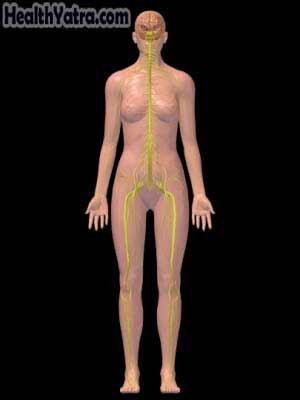Definition
Agoraphobia is an anxiety disorder. It is an irrational fear of being trapped in places or situations where escape is difficult. People with agoraphobia may not leave the house.
Causes
The exact cause of anxiety disorders is not known. Agoraphobia often occurs withpanic disorders. People with a panic disorder may having a panic attack and not having anyone around to help them. This can lead them to avoid certain places or situations. Other factors that may contribute to the development of agoraphobia include:
- Genetics
- Changes in brain chemistry or activity
- Having a nervous system that reacts excessively, even to normal stimuli
- Increased awareness of physical changes, such as increased heart rate
- Distorted thinking, which may start a cycle of fear

Risk Factors
Factors that may increase your chance of agoraphobia include:
- History of panic attacks or panic disorder
- A tendency to be nervous or anxious
- Stressful situations
- Family members with panic disorder or phobias
- Other psychiatric disorders
Symptoms
Symptoms include:
- Fear of being in a crowd, shopping, standing in line, or similar activities
- Fear of riding in a car, bus, or train
- Creation of a safe zone
- Feelings of anxiety when outside the safe zone
- Fear of being alone
- Avoidance of situations that might cause a panic attack
- Restriction of activities outside the home
- Feeling of being safer with a trusted friend
Feared situations may trigger a panic attack. Attacks start quickly and peak in about 10 minutes. A panic attack usually includes four or more of the following:
- Intense fear
- Shaking
- Rapid heartbeat
- Pounding or racing feeling in the chest
- Sweating
- Blushing
- Shortness of breath
- Chest pain
- Dizziness or lightheadedness
- Hot flashes or chills
- Numbness or tingling
- Nausea
- Feeling of loss of control or “going crazy”
- Fear of having a heart attack or dying
Agoraphobia is also commonly associated with the following conditions:
- Panic disorder
- Depression
- Anxiety
- Posttraumatic stress disorder (PTSD)
Diagnosis
The doctor will ask about your symptoms and medical history. A physical exam will be done. You may be asked questions about your:
- Use of alcohol and drugs
- Mental health history
- Family’s mental health history
There are no tests for agoraphobia or panic disorder. Your doctor may order heart or blood tests done to look for an underlying cause.
Treatment
Treatment aims to help you overcome irrational fears and live more independently. Goals include:
- Reducing the number and severity of panic attacks
- Learning to manage panic attacks that do occur
Treatments may include:
Cognitive-Behavioral Therapy
Cognitive therapy can help to change troublesome thought patterns. Behavioral therapy will help you learn how you can alter your actions. The combination therapy will help you:
- Identify and change anxious thoughts
- Use relaxation techniques to decrease feelings of anxiety
- Control breathing by taking slower, deeper breaths
- Cope with physical changes associated with anxiety
- Confront feared situations
Exposure Therapy
Exposure therapy exposes you to the factor causing the fear while in a safe environment. The sessions often include repeated, detailed imagining of the traumatic experience. The therapy will help people face their fear and gain control of it while it is happening. Exposure therapy methods range anywhere from a gradual approach to the fear to complete confrontation all at once.
Exposure therapy may be done alone or in combination with other treatments.
Medications
Your doctor may prescribe medication as well as therapy. Medication options may include:
- Antidepressants
- Benzodiazepines—may cause dependence
- Other anti-anxiety medicines
It is important to take all medications as instructed by the doctor.
Lifestyle Changes
Stress management may also help. Lifestyle changes to manage stress include:
- Get some exercise every day
- Get adequate sleep
- Avoid caffeine, alcohol and nicotine
Prevention
Agoraphobia often develops as a response to panic attacks. If you have had a panic attack, instead of avoiding the place or situation, seek medical care. Early treatment for panic attacks can help prevent agoraphobia.
Agoraphobia Treatment in India – Page Keywords:
Agoraphobia Definition, Agoraphobia Definition Causes, Agoraphobia Symptoms, Agoraphobia Treatment in India, Agoraphobia Treatment Cost in India, Agoraphobia Surgery Cost, Top Agoraphobia Treatment Hospital, Top Agoraphobia Treatment Doctor in India, Agoraphobia Meaning in Marathi, Agoraphobia Treatment Near me, Agoraphobia Complications, Travel India for Agoraphobia Treatment, Agoraphobia Treatment in Arab Countries, Agoraphobia Treatment in Bangladesh, Agoraphobia Treatment in Dhaka, Agoraphobia Meaning in Bengali, Agoraphobia Meaning in Arabic, Agoraphobia Meaning in Hindi, Agoraphobia Treatment in Bahrain, Agoraphobia Treatment in Egypt, Agoraphobia Treatment in Iraq, Agoraphobia Treatment in Jordan, Agoraphobia Treatment in Kuwait, Agoraphobia Treatment in Lebanon, Agoraphobia Treatment in Saudi Arabia, Agoraphobia Treatment in United Arab Emirates, Agoraphobia Treatment in Sudan, Agoraphobia Treatment in Tunisia, Agoraphobia Treatment in Nepal, Agoraphobia Treatment cost,
Agoraphobia Treatment Cost in India, Agoraphobia Top Doctors Best Hospital in India
